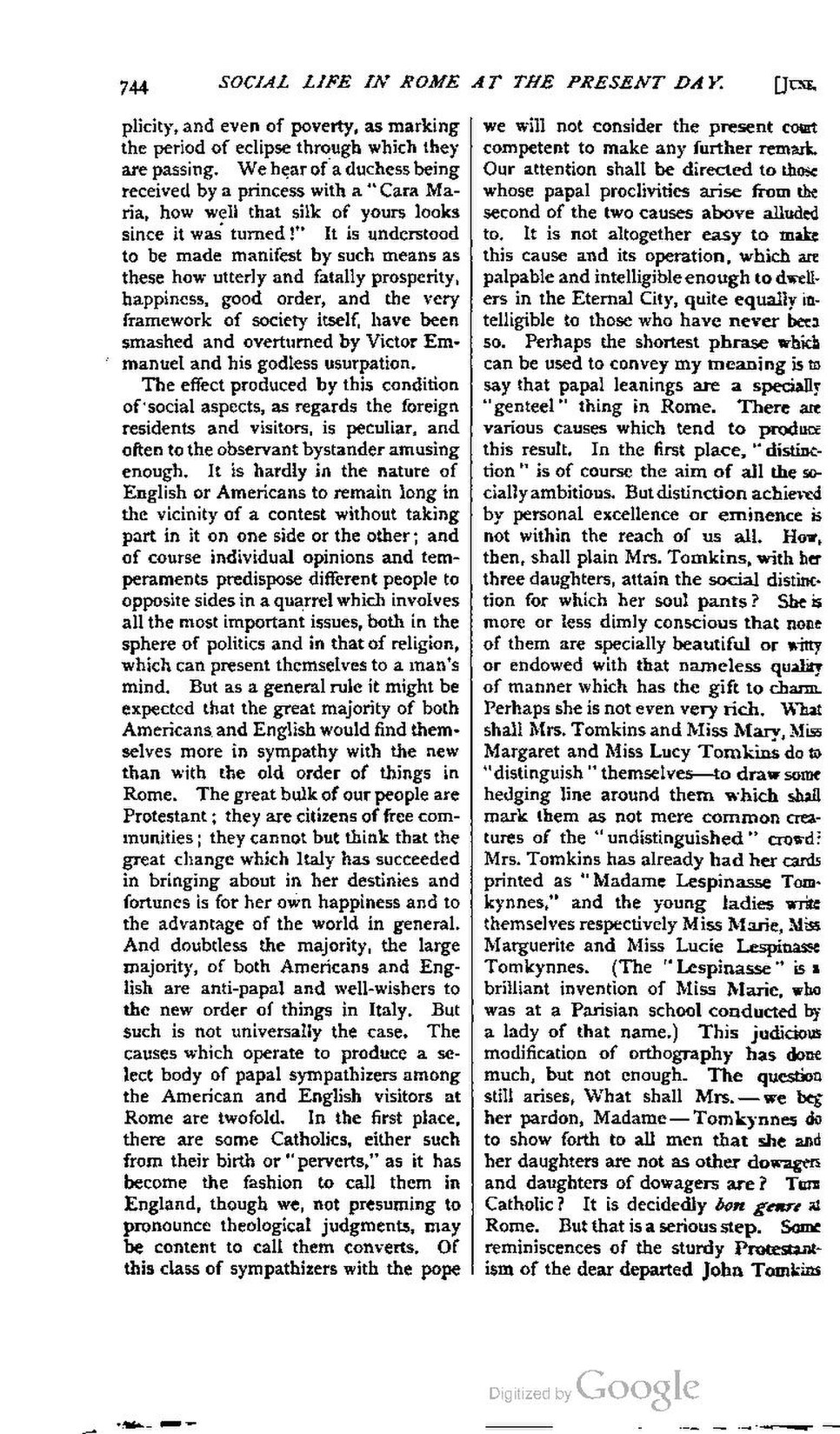plicity, and even of poverty, as marking the period of eclipse through which they are passing. We hear of a duchess being received by a princess with a "Cara Maria, how well that silk of yours looks since it was turned!" It is understood to be made manifest by such means as these how utterly and fatally prosperity, happiness, good order, and the very framework of society itself, have been smashed and overturned by Victor Emmanuel and his godless usurpation.
The effect produced by this condition of social aspects, as regards the foreign residents and visitors, is peculiar, and often to the observant bystander amusing enough. It is hardly in the nature of English or Americans to remain long in the vicinity of a contest without taking part in it on one side or the other; and of course individual opinions and temperaments predispose different people to opposite sides in a quarrel which involves all the most important issues, both in the sphere of politics and in that of religion, which can present themselves to a man's mind. But as a general rule it might be expected that the great majority of both Americans and English would find themselves more in sympathy with the new than with the old order of things in Rome. The great bulk of our people are Protestant; they are citizens of free communities; they cannot but think that the great change which Italy has succeeded in bringing about in her destinies and fortunes is for her own happiness and to the advantage of the world in general. And doubtless the majority, the large majority, of both Americans and English are anti-papal and well-wishers to the new order of things in Italy. But such is not universally the case. The causes which operate to produce a select body of papal sympathizers among the American and English visitors at Rome are twofold. In the first place, there are some Catholics, either such from their birth or "perverts," as it has become the fashion to call them in England, though we, not presuming to pronounce theological judgments, may be content to call them converts. Of this class of sympathizers with the pope we will not consider the present court competent to make any further remark. Our attention shall be directed to those whose papal proclivities arise from the second of the two causes above alluded to. It is not altogether easy to make this cause and its operation, which are palpable and intelligible enough to dwellers in the Eternal City, quite equally intelligible to those who have never been so. Perhaps the shortest phrase which can be used to convey my meaning is to say that papal leanings are a specially "genteel" thing in Rome. There are various causes which tend to produce this result. In the first place, "distinction" is of course the aim of all the socially ambitious. But distinction achieved by personal excellence or eminence is not within the reach of us all. How, then, shall plain Mrs. Tomkins, with her three daughters, attain the social distinction for which her soul pants? She is more or less dimly conscious that none of them are specially beautiful or witty or endowed with that nameless quality of manner which has the gift to charm. Perhaps she is not even very rich. What shall Mrs. Tomkins and Miss Mary, Miss Margaret and Miss Lucy Tomkins do to "distinguish" themselves—to draw some hedging line around them which shall mark them as not mere common creatures of the "undistinguished" crowd? Mrs. Tomkins has already had her cards printed as "Madame Lespinasse Tornkynnes," and the young ladies write themselves respectively Miss Marie, Miss Marguerite and Miss Lucie Lespinasse Tomkynnes. (The "Lespinasse" is a brilliant invention of Miss Marie, who was at a Parisian school conducted by a lady of that name.) This judicious modification of orthography has done much, but not enough. The question still arises, What shall Mrs.—we beg her pardon, Madame—Tomkynnes do to show forth to all men that she and her daughters are not as other dowagers and daughters of dowagers are? Turn Catholic? It is decidedly bon genre at Rome. But that is a serious step. Some reminiscences of the sturdy Protestantism of the dear departed John Tomkins
